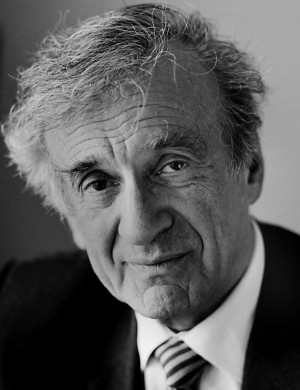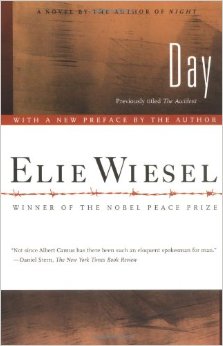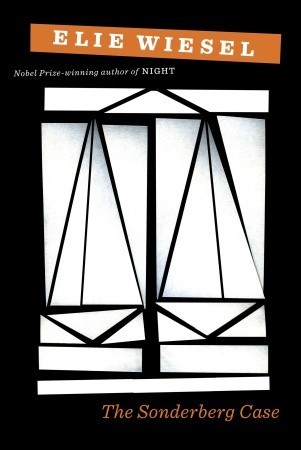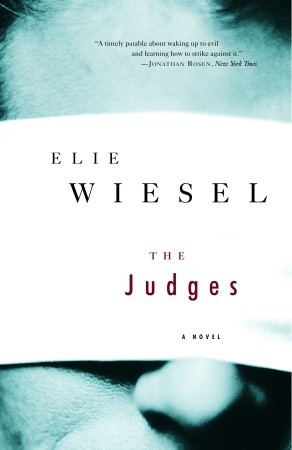A Sage’s Passing: Elie Wiesel (1928-2016)

There are many sad things about Elie Wiesel’s passing, foremost being his passing itself. Whilst I cannot claim to have known him in a personal manner, he never once, in any of his memoirs or interviews, gave the impression that there was anything he cared more about than mankind’s well-being. Even after the horrors he endured and after witnessing the bare savagery that man is capable of, he didn’t let his faith in man slip away. Perhaps not faith in man so much as faith in what man can be. There was more than enough reason for him to pass on that faith, but he never did. His life truly is a monument to the fact that the storms of sorrow and horror that so often blow through the world cannot snuff out wisdom, tenderness, and courage, which to my mind, are the divine elements that composed the fabric of Wiesel’s soul.
But there is another thing to grieve with Wiesel’s passing, and that is just how little his death has been acknowledged. Before I make it sound like he passed without any notice, I direct you to these loving tributes to him courtesy of National Review’s Jay Nordlinger and Israeli Prime Minister, Benjamin Netanyahu. There are similar pieces in The Atlantic and many news sources have devoted some time to writing about him.
What’s sad is not that his death hasn’t been reported; it has. What’s sad is how little people are talking about it, if they talk about it at all. Those who knew him are undoubtedly talking about him, but what of everyone else?
What makes the lack of talk so piercing is that it is such a dreadful twist to the end of his life. Wiesel, who adored the act of remembering, devoted his life to ensuring that man’s crimes and his achievements are never forgotten. In his own words, “Without memory, there is no culture. Without memory, there would be no civilization, no society, not future.” And yet, his passing has gone virtually unnoticed. This is the bitterest sort of irony.
While I can’t say for sure if this is the reason, I do have a theory (shoddy though it is) as to why there isn’t more talk about him and his work. Elie Wiesel was a teacher, lecturer, and human rights activist. But the reason most people will remember him is for his autobiographical account of his survival in Auschwitz and Birkenau, Night. It is read and taught in myriad high schools and universities; book clubs assign it; history buffs read it; and even through word of mouth, it manages to make its rounds. While there may not be many people who remember who wrote it, they will undoubtedly be able to tell you if they’ve read Night or not. Just from personal experience, I have yet to meet a person who read Night and said it didn’t leave an impression. I haven’t even heard someone say they disliked it.
This, however, is where the trouble starts. Night is such a remarkable book, so gripping, absorbing, and true that one can’t imagine anything ever topping it. Surely the author devoted the entirety of his afflatus to producing such a magisterial work. But he didn’t. In fact, he published over 30 books, in addition to countless essays and articles. Inspired in large part by his mentor Francois Mauriac (the Nobel Laureate who encouraged him to write Night) and his Hassidic grandfather, Wiesel wrote a number of deeply spiritual and haunting books; some of them, to my mind at least, are as good as the book that put his name on the map.

Take Day (previously titled The Accident). It is the story of a nameless young man who survived the Holocaust. His girlfriend, Katharine, is completely devoted to him and wants them both to share a life. But the horrors he’s experienced cannot allow him to fully open himself up to her. One day, he attempts suicide and awakens a few days later in a hospital bed. It is only at that moment, between life and death, that he discovers that Katharine’s love is a choice that will alter the whole of his being. Should he accept it, he will return to the land of the living, but will have to live with a woman who will never fully know him. To deny her love is to die and succumb to the agony he carries with him on a daily basis, but he will be reunited with those he lost in mankind’s darkest hour.

There is also The Sonderberg Case. It tells the story of Yedidiah, a young journalist living in New York (many of Wiesel’s characters were, to some degree, a representation of Wiesel himself). He learns that a young German fellow, Werner Sonderberg, is being accused of having murdered his own grandfather. Yedidiah is tasked with recording the events of the trial for his paper. On the day the judge asks Sonderberg how he pleads, Sonderberg stands up and declares, “Not guilty… and guilty.”

I shall leave one more recommendation. The Judges is the closest that Wiesel got to writing a thriller, though it is filled with all the philosophy and spiritual depth that was so characteristic of his entire body of work. A plane is forced down in a blizzard, and five of the passengers decide to take refuge in a small cottage a few miles from where they landed. The owner of the home, who simply calls himself the Judge, takes them in, offers them tea and a warm hearth. But then things take a turn for the bizarre as the Judge begins to ask them all personal questions. Very personal questions. When they ask him to stop, he reveals that he intends to kill one of them before the end of the night; the one who is least worthy of living. He will, however, allow them to decide which one of them it should be.
While I thoroughly enjoyed each of these books (among others I’ve read and not mentioned) I concede that they are of the love it or hate it variety. Night is so widely read because it is part history, part poetry, part spiritual drama. It is also told in very simple, blunt prose and the storyline never goes off on any tangents. In other words, anyone can read it and understand it.
The same cannot be said about any of his other works. Wiesel, who also loved the Jewish sages of antiquity and the rich Jewish history of the Old Testament, wrote in a way that makes one wonder if he was attempting to capture the whole of humanity in his work. To read his books is to marvel at a man who could so effortlessly weave together poetry, wisdom, the past, present, and future, evil, righteousness, beauty and wonder into a rich story of Biblical proportions. Like the sages he so admired, Wiesel was more wizard than mere storyteller. In reading his work, one is catapulted into the maelstrom that is man and his being, and how his search for God and meaning mirrors God’s search for the divine in His creation.
Like I said, Stephen King this is not. James Patterson this is not. While I find Wiesel’s work to be wondrous, I would by no means recommend it to those who prefer tight, fast-paced novels that excite, frighten, and entertain. This is work that demands slow, deliberate reading if one is to see the full scope of the storytelling (I do, however, fully recommend Night to anyone who hasn’t read it).
Given that his work isn’t for everyone, I can easily see why his books aren’t flying off the shelves; why online personalities aren’t making video tributes to him; why his passing isn’t being reported on E! News. Perhaps that’s the way it should be though. Wiesel never saw himself as a victim, but as a survivor. He didn’t live a loud, boisterous life. To listen to him speak in interviews and to read his work, one gets the impression he was content with having lived long enough to earn the affections of a woman, to experience the trials and joys of parenthood, to tell his story and the stories of other survivors, and to see his beloved Israel rise again.
His work, then, did not hit the shelves with a neon sign which demanded that each and every passerby pick up a copy. Rather, his books sit quietly on shelves, passed by most. But every once in a while, someone will pick one up and discover that Wiesel was like one of his beloved “madmen,” one who could understand, and criticize while understanding. One who stood in front of the innocent and defended them from the wicked. One who could always find the grace to rejoice in the glories of life itself.
And now he’s left us. Those of us who never had the chance to speak to him or listen to him in person will no longer have that chance (at least not in this life). But I don’t think that one need speak to him if all one wishes is to take a glimpse into his life and loves. His work speaks for him. And being that he devoted his life to maintaining what he called “the kingdom of memory,” it seems appropriate to remember him in turn, even if it is in my own feeble capacity.
What do you think? Leave a comment.











Wonderful article! I am exceptionally thrilled to see this article in it’s finished product as it is an informative piece that allows many to learn so much more about Elie Wiesel than his just being the author of Night, or a Holocaust survivor (though these are two momentous things, please do not disregard this statement as frivolous). There was so much more to this man that the mainstream public failed to notice. When he passed, I was quite disappointed to see the lack of coverage on his numerous accomplishments. He serves as a wonderful beacon of hope and a reminder to never let hate blur one’s path in life. His continuous reminder to never forget the past was an hope of never repeating the horrific events of the past. In his speeches, he painted vivid pictures of atrocity, not for sensationalism, but to reach the audience and make them realize that this was real, not some mere statistics in a textbook. By making people feel, it makes them less likely to be able to forget. Excellent job, August Merz.
danielle577,
Your reply is very tender, and I appreciate it very much. Moreover, you’ve encapsulated the essence of Wiesel in saying that he was a, “wonderful beacon of hope and a reminder to never let hate blur one’s path in life.” That’s as great a description of him as I’ve ever heard.
Thanks again for your kind comment,
August
A very fitting obituary. My only complaint is that the Artifice’s peer-review process couldn’t allow this to be published sooner (i.e. closer to the time it was written, and Wiesel’s passing), but it continues to resonate months later. Well done.
ProtoCanon,
It was a bit lax, and it is a shame that it didn’t come out sooner, but as you said, at least it’s out now. Thanks for your kind comment.
-August
Rip Elie Wiesel, we will never forget your bravery, courage, and love for the world. May you live on in peace.
Celinda,
Amen. Thank you for your comment.
-August
Everybody knows how awful the holocaust is, but when I read his book I can’t talk about it because it just makes me so angry and upset
Hoppe,
It is tough to read about, but well worth it, if only to be aware of what happened. Thanks for your comment.
-August
I was lucky enough to see him at the 20th anniversary of the United States Holocaust Museum in D.C.. Unbelievable man!
kaiser,
That’s outstanding! I’m quite jealous (in a good way). I’ve no doubt it was an invigorating experience.
Thanks for your comment,
August
He will be remembered and remembered again as long as people like yourself spread the message about his work. A truly remarkable person who inspires us to rise above not only the great tragedies of our human experience but the soul destroying pettiness of everyday life.
Munjeera,
He truly was a remarkable man, and as you said, his work will ensure his memory.
Thanks for your comment,
August
Elie Wiesel can never die.
Hyman,
I’m with you completely.
Thanks for your comment,
August
Rest in Peace Elie Wiesel finally reunited with your family.
Laurel,
As he should be and deserves.
Thank you for your kind sentiment,
August
He’s such an admirable man who’s youth was cut short by the nazi’s who took it away from him
jack,
It really was a shame, and yet he made so much of himself afterwards.
Thank you for your comment,
August
I was ready to jump into the book and support Elie all the way. I was ready to help him and push him threw. If I was him I probably would have gaven up.
Ivory,
One certainly wonders how they would act where they in Wiesel’s place. At least we have his insights to tell us what should be done when surrounded by evil.
Thank your for your comment,
August
We had him at my high school like 2 months ago. I think we were the last school to have him come to a school. Got to meet him, and now he is gone. Damm
allie,
That’s fantastic! It looks like you and kaiser are among the lucky ones who actually go to see him and meet him. I’m sure it was a great experience.
Thank your for your comment,
August
I’m reading his book Night in English class and its so good.
Gidget,
Good deal. I’m glad you like it.
Thanks for your comment,
August
Thank you. A very fine article about an important figure. Afflatus indeed.
Tigey,
It was my pleasure. Thank you for your kind words, as well.
-August
This is so important. He left such a mark on humanity itself, and I think that we need to recognize one of the most important things about him and his experience- one of the things you touched on in your article- the idea that after all he had been through and seen, he still kept his faith in what the human race can be. If someone who has been through the worst experience in human history can still hold faith that the human race can do great things, then why can’t the rest of us?
LilyaRider,
You’re quite right. We may belly-ache about small things and say that we’ve lost our faith in humanity, but if he and the thousands like him who endured and managed to live fulfilling lives can manage to find goodness in the world, then it certainly makes one stop and wonder if they aren’t taking things a little to seriously.
Thanks for your comment,
August
What a great human being and writer!
Ina,
He certainly was.
Thanks for the comment,
August
Ina,
He certainly was. Thanks for your comment.
-August
Rest in Peace and just eternal fame as a proactive panhumanitarian.
Higginbotham,
He no doubt deserves his peace and his recognition as a panhumanitarian (good way to describe him, by the way).
Thanks for your comment,
August
I pray he is now reunited with his family. Such an amazing human being. Rest in Peace.
Felipa,
I’m sure he is. It feels certain that he is, in a funny way. My prayers are with him and those who knew him as well.
Thank you for your warm sentiments,
August
Great tribute to a wonderful man.
Nu,
Thank you for the kind words.
-August
Elie Wiesel is a personal hero of mine! He is a great man!
Schell,
That’s nice to hear. Thanks for the comment.
-August
one of the brightest lights in our history has sadly gone out
Malka,
It is a great shame that he’s departed, but his work still stands as a testament to his life for those who are interested in it.
Thanks for the comment,
August
I actually read one of the guy’s books.
Regena.
That’s good to hear. Which one was it?
-August
He used to pray in my temple when I lived in NYC..I wish I had met him.
sea,
That’s great. It, no doubt, would’ve been great to meet him. Perhaps someday we’ll get that chance.
Thanks for the comment,
August
I can remember reading “Night” for the first time and the strong and emotinal feeling it gave me. His words have inspired and gave a sense to the ignorance of the Holocaust, and his work to bring justice where it was due was never ending. He should be remembered and praised for an endless amount of years and centuries, like his work is.
sydneelarson,
God willing he’ll be remembered as long as you hope he is, which is the least he deserves.
Thanks for the comment,
August
This is such a touching tribute to such an amazing man. In 9th grade my class read his book “Night””. It is one of the most emotional and moving books that I have ever read. Elie Wiesel went through so much in his life, but he still was a positive person that believed in the goodness of humanity. He was truly an inspiration and he will be greatly missed.
TaylorNCampbell,
He will be, but thankfully, he was willing to share so many of his insights with the world so there’ll always be a measure of him with us.
Thanks for the comment,
August
this man I don’t know where to begin with I think I’ll start with how much he meant to me he was my hero and my inspiration and my world is just a little more empty without him. I loved, cared for, and admired him so much it’s hard to describe when he died it felt like I had lost a family member or friend the loss was so hard to take and even now two months later I can’t accept the fact that he’s gone he was the reason I got into studying the Holocaust in the first place after reading Night to have lost him has been beyond devastating for me but i know that even though he’s gone his words will never die and that brings me a little comfort but i wish he was here I miss him so much and I will never forget him
Kathleen,
I’m glad he had such an impact on you. Thanks for the kind words you directed his way.
-August
ver relevant article. i remember reading night in high school.
cbell,
As do I; I’ve always considered it a remarkable book.
Thanks for the comment,
August
“Faith in what man can be.” AHHHH I love that! Such a wonderful article!
I do remember reading it in high school, how fantastically dark it was, how it chills you to the bone. I definitely need to rediscover “Night” and look into the books you have suggested.
Thank you for such an inspiring tribute!
I think it was really important that someone discussed and wrote about this. While I do think that he was a humble man, I wish more of his novels WERE flying off of the shelves. His memoirs, experiences, and insights reflect horrors of mankind and history that speak to darker moments than most of us can imagine. I love that more and more people are admiring his work, and articles like this are spreading the appreciation!
These are great words, thank you for writing them.
He truly was an inspiration to all.
I remember reading “Night” a few years ago and I remember how grim and harrowing it was, not only to read, but to conceptualize. The horror of the Nazi concentration camps will forever leave an indelible mark in German, Jewish, and World War II history. “Night” and his personal life is forever a beacon to that light.
I have always been interested in studying the Holocaust and the effects that it has had on survivors, so I’ve read Night many many times and it has always made me very emotional and passionate about humanity. However, I had no idea that he published so many other works, and will now go find them immediately and devour them as well. Thanks for this beautiful and kind article.
Elie Wiesel was a true giant- in more than 1 respect—as a writer and as a human being. Not much more can be said about such a person other than he left us too soon.
RIP Elie Wiesel. Your light will forever burn perpetually in my eyes. Even though you are gone your memories live on.
Thank you for this tribute to a wise and gifted soul, as well as raising awareness of Wiesel’s other works.
I read his play, well, it’s meant to be read, but it’s a play. Called “The Trial of God” years ago. If you haven’t read it. I can’t suggest it highly enough. It’s tough to get through but very good. It’s a play and philosophical dialogue all at once.
Good to have a nice overview of some of Wiesel’s works.